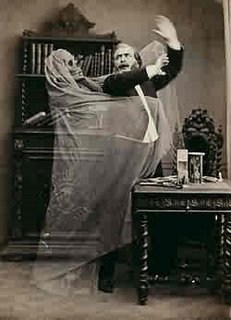
The latest bulletin from ReligionLink came out and the title is "Popularity of paranormal soars." The bulletin uses the results of the recent Baylor University survey on religion in America as its starting point. Recall in a previous post on this blog that the poll showed great interest in the paranormal. Below is the introduction to the bulletin, and the entire piece may be found here. This item should be of interest not only because Americans are more inclined to think of the paranormal near Halloween with our stereotypical understandings of the various influences on this holiday, but also because it should raise a series of questions for the church.
The interest in the paranormal is found outside and inside the church. What does this say about the church's neglect (other than denunciation) of the issues of spiritual powers and divine guidance?
Many interested in the paranormal use various forms of divination. Christians assume this is biblically off limits when they traditionally cite certain Old Testament texts, but what about those in the Old and New Testaments that appear to involve forms of divination that are viewed more positively?
How will the church engage the many people involved in various forms of folk magic and nature-based spiritualities where the paranormal is more readily accepted?
Here's the introduction to ReligionLink's bulletin:
As children know, Halloween is a time to let the imagination run wild. A new survey of religious beliefs, however, shows that adults do the same, and not just for Halloween. Baylor University’s expansive survey, released in September 2006, found what it termed a “surprising level” of paranormal belief and experience. According to a 2005 Gallup Poll, about 75 percent of Americans hold some form of belief in the paranormal – extrasensory perception, ghosts, telepathy, clairvoyance, astrology, communicating with the dead, witches, reincarnation or channeling.
Some religions, such as Wicca or neo paganism, draw deeply from the wells of reincarnation and spells. Some traditions or cultures mix elements from traditional, organized religion with the supernatural. Yet most religions are laced with elements of mysticism or the surreal: Consider a voice coming from a burning bush, water turned into wine, lamp oil that lasted eight days, prophets and angels in the Quran.
October is a rich time to explore why so many people believe in the paranormal and how those beliefs are reflected in everyday actions and popular culture. After all, religion and the paranormal share a common challenge: Just because we can’t prove it, does that mean it’s not there?
Why it Matters
Both nonbelievers and people of faith keep blurring the lines between what they’re sure about and what they sense could possibly be. Ordinary people have had dreams that came true, encountered coincidences that don’t feel like coincidences, felt the presence of someone they love who has died. Many wonder: How big is the world, and what does it mean to believe in the divine?
No comments:
Post a Comment